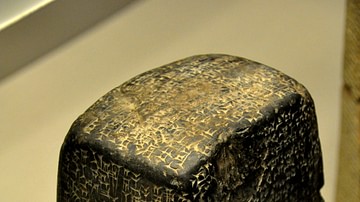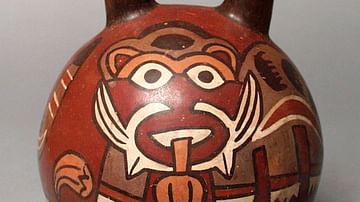Search Definitions
Browse Content (p. 255)

Definition
Adad Nirari I
Adad Nirari I (r. 1307-1275 BCE) was the king of the Assyrian Empire who initiated the first major expansion of the Assyrian kingdom from the city of Ashur throughout the region of Mesopotamia. He also instituted what would become standard...

Definition
Consul
In 509 BCE, with the exit of the last Etruscan king, Lucius Tarquinius Superbus, the Roman people were presented with a unique opportunity, an opportunity that would eventually have an immense impact on the rest of Europe for centuries to...

Definition
Tiglath Pileser III
Tiglath Pileser III (745-727 BCE) was among the most powerful kings of the Neo-Assyrian Empire and, according to many scholars, the founder of the empire (as opposed to the claims for Adad Nirari II (912-891 BCE) or Ashurnasirpal II (884-859...

Definition
Ancient Syria
Syria is a country located in the Middle East on the shore of the Mediterranean Sea and bordered, from the north down to the west, by Turkey, Iraq, Jordan, Israel, and Lebanon. It is one of the oldest inhabited regions in the world with archaeological...

Definition
Shulgi of Ur
Shulgi of Ur (r. 2029-1982 BCE) is considered the greatest king of the Ur III Period in Mesopotamia (2047-1750 BCE). His father was Ur-Nammu (r.2047-2030 BCE), who founded the Third Dynasty of Ur, and his mother was a daughter of King Utu-Hegal...

Definition
Ur-Nammu - Founder of the Sumerian Renaissance
Ur-Nammu (c. 2112-c. 2094) was the founder of the Third Dynasty of Ur in Sumer who initiated the so-called Ur III Period (c. 2112-c.2004 BCE) also known as the Sumerian Renaissance. He is best known as the king who composed the oldest extant...

Definition
Pliny the Elder
Aside from the usual contributions of its noble politicians and military commanders, the story of a nation also records the invaluable literary influences of its poets, dramatists, and historians. The long history of the Roman Empire is no...

Definition
Ancient Sicily
The Mediterranean island of Sicily, with its natural resources and strategic position on ancient trading routes, aroused the intense interest of successive empires from Carthage to Athens to Rome. Consequently, the island was never far from...

Definition
Science
The term science comes from the Latin word scientia, meaning "knowledge". It can be defined as a systematic attempt to discover, by means of observation and reasoning, particular facts about the world, and to establish laws connecting facts...

Definition
Nazca Civilization
The Nazca civilization flourished on the southern coast of Peru between 200 BCE and 600 CE. They settled in the Nazca and other surrounding valleys with their principal religious and urban sites being Cahuachi and Ventilla, respectively...